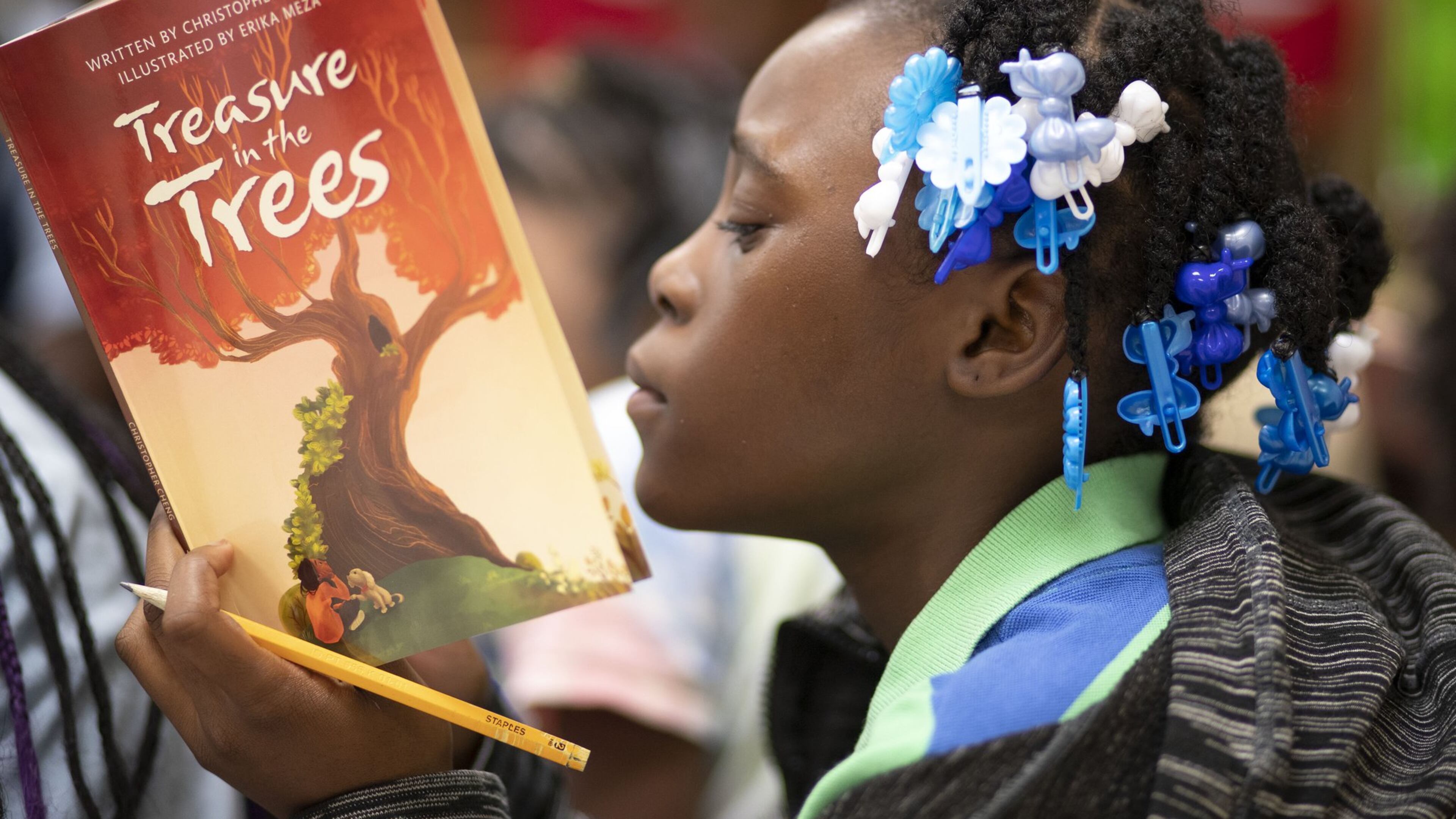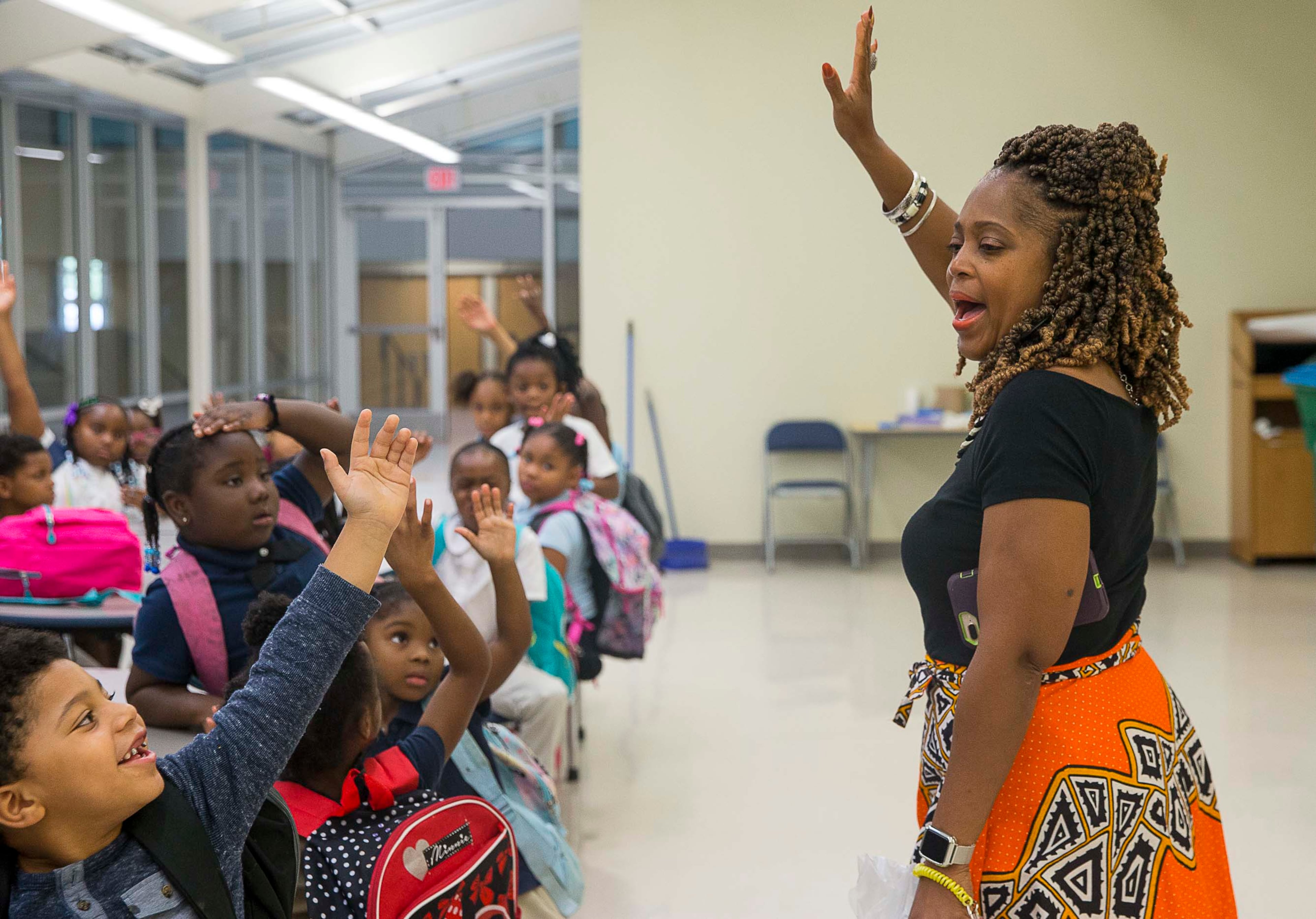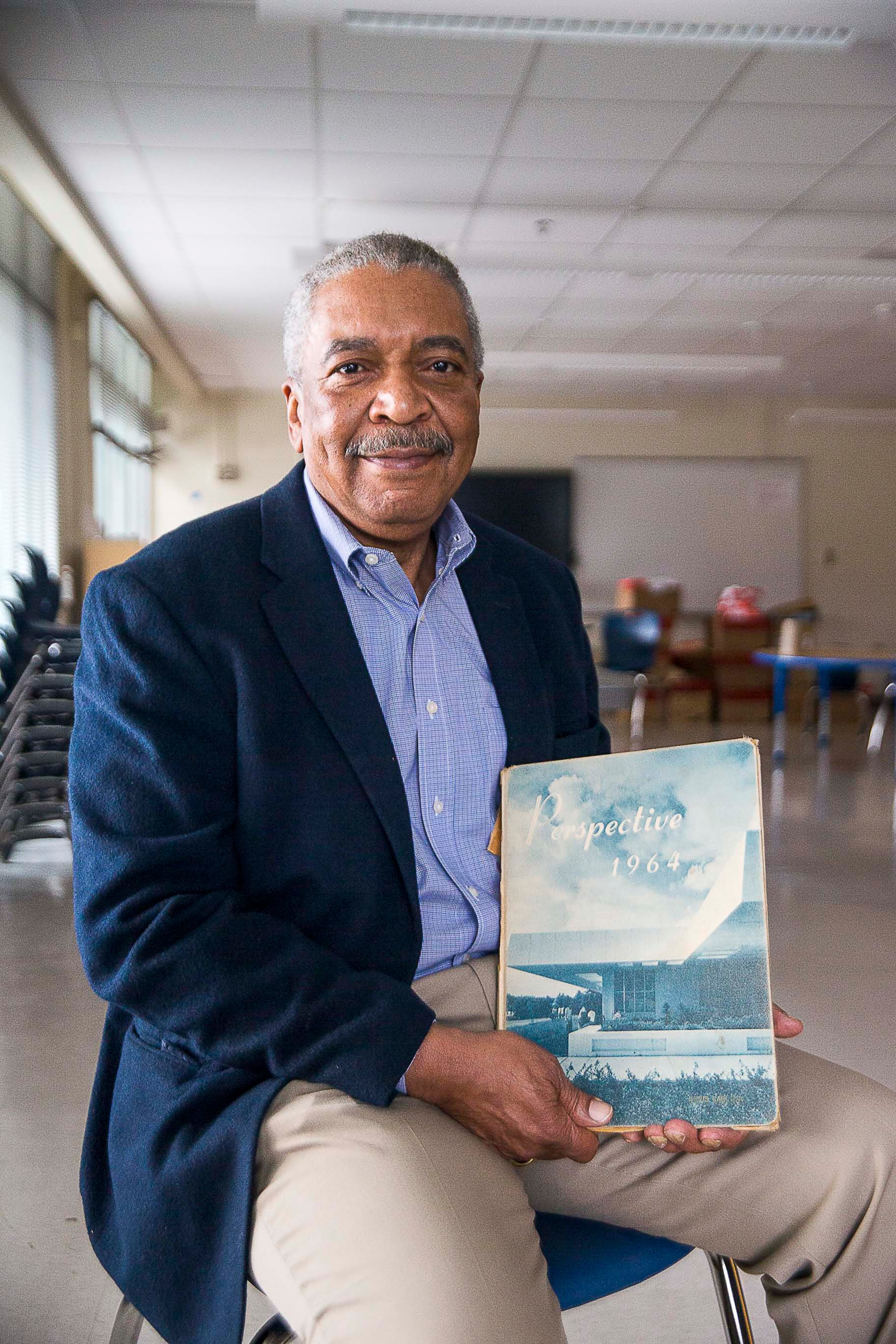Voices from Harper-Archer Elementary School

“People should care because these scholars, just as much as the scholars on another side of town, are the future of Atlanta. The only way that Atlanta gets out of… this cycle of poverty, I think, is by making sure that scholars are educated and successful and that they are afforded the same opportunities as other students.”
— Justin Browning, Harper-Archer instructional coach
VIDEO: ‘It takes every single one of us’
“Children [are] coming from diverse backgrounds, and they don’t get ‘I love you, have a good day, do your best.’ I always tell my grandkids: ‘Make today count.’ And, a lot of kids just don’t get ‘I love you,’ ”
— Pearl Lilly, grandmother of two Harper-Archer students
“Hope is like a real thing. So if I didn’t have it then how could I do this work every day? Because you could get sad in here; you can cry for sadness as opposed to joy. And the work is so hard because just when you think you’re making some gains then something happens and you fall like 10 steps back.”
— Dione Simon Taylor, Harper-Archer principal
In some schools, students just don’t have the same foundation for learning as others. It’s a problem Atlanta’s school district has been confronting for generations, and the district has been in a multiyear, multimillion-dollar project aimed at helping.
Some steps, such as turning six schools over to charter groups to run, have been controversial and watched nationally, since educational inequity is a problem all over the country, not just in metro Atlanta.
Teachers know that whatever they do in the classroom, they can’t control some factors – parental involvement and generational poverty, for example – that have powerful influence on their students’ ability to learn. Atlanta’s results so far underscore just how difficult turnaround is. Schools have seen some gains, but there’s minimal evidence it’s because of the turnaround investments.
The Atlanta Journal-Constitution wanted to know: Just how does the school give students the proper education they’ll ultimately need to compete with their peers for adequate jobs, and to be responsible, productive citizens in our communities?
To answer that question, we knew we had to be in the classrooms and hallways of a school trying to find solutions to these challenges.
We knew we had to speak to community residents and parents.
The AJC asked Atlanta school officials to give us unprecedented access to a school being targeted for special attention because of its long-standing challenges.
Harper-Archer Elementary, the “turnaround school” the district selected when the AJC proposed this project, is new. The west Atlanta school opened this year to serve neighborhoods that are among the poorest in Georgia.
School officials allowed our reporter and photographers a close-up view of the people and the everyday goings-on in the life of that school community.
Over several months, AJC reporter Vanessa McCray and photographers Alyssa Pointer and Bob Andres spent many days observing, interviewing and recording the efforts and the motivations of the dozens of people who are trying to ensure that what’s in store in the lives of the children there can be brighter than their beginning.
Successful communities support and invest in the education of children. Strong schools use that support to set high expectations and to execute bold, cutting-edge initiatives.
Not every school in Atlanta can claim such success. For some city schools, the challenges seem too great to overcome.
Students at Harper-Archer Elementary School come to class each day from Atlanta neighborhoods struggling with the harmful side effects of generational poverty. They also suffer from inconsistent parental engagement and many of these children lack basic reading skills – the foundation for academic accomplishment.
The Atlanta Journal-Constitution wanted to know, just how do teachers, principals, counselors, and other school staffers try to give these children the proper education they’ll ultimately need to compete with their peers for adequate jobs, and to be responsible, productive citizens in our communities?
Atlanta Public Schools gave the AJC unprecedented access to the inner workings of its efforts to turnaround this school. The stories inside this special section are the result of our reporter and photographers spending dozens of hours at Harper-Archer over several months.
If the folks at Harper-Archer are successful with their bold plans, the school will serve as a template for other urban schools struggling to meet basic standards.
We interviewed school leaders, teachers, community residents, and parents, to get the full picture of the magnitude of the challenge and of those who are trying to find solutions.
They are stories of determination and hope.
- Todd C. Duncan, Senior Editor Local Government and Education
“I think at a turnaround school, you think you want to come in [and] you want to automatically turn around academics. Academics is not first. Academics is not first. The other things, the SEL [social and emotional learning], that building relationships, being mindful — that is the No. 1 thing, and in other schools you don’t have to worry about that.”
— Alecia Westbrooks, Harper-Archer teacher
“I think people should know that this is a fun school, a lot of things for you to do. It’s a good environment, good vibes.”
INSIDE HARPER-ARCHER: MORE STORIES
» Teachers try to fill academic, skills gap
— T’era Stewart, Harper-Archer fifth grade student and student government president
“Right now we have an epidemic of kids who cannot read. So if we don’t help them to do better, to be better for us, then we are going to be the ones that suffer. So at the end of the day we have to care, because though they are not mine, we still have an investment in them because they’re going to have to invest in us.”

— LaJuana Ezzard, Harper-Archer director of partnerships and programs
“I don’t think that … Harper-Archer as it stands is able to close the gap on its own without some other rethinking of all the stuff that’s happening outside the school. And I have nothing but faith in the leadership and the team. We’ve done a high quality process. The building’s beautiful. We’ve lived up to everything that we promised and more, and yet the lift will be real, and there will be some plateau.”
— Atlanta Public Schools Superintendent Meria Carstarphen on the student achievement gap
INSIDE HARPER-ARCHER: THE PHOTOS & VIDEOS
“I think that they chose a dynamic leader and that they definitely got it right for Harper-Archer.”
— Stephanie Johnson, Georgia Department of Education deputy superintendent for school improvement, on APS picking Dione Simon Taylor as principal

“I don’t want it to be a poverty-stricken school. It does not have to be, but it’s up to the board of education, it’s up to the community or to the civic leaders. It’s up to the neighborhood to see that that changes.”
— Artie Cobb, president of the Charles L. Harper High School International Alumni Association
Our journalists
Vanessa McCray is an education reporter at The Atlanta Journal-Constitution. She moved to Georgia in 2017 to join the AJC's education team and cover Atlanta Public Schools. Previously, she wrote about K-12 schools, colleges and universities for The Blade newspaper in Toledo, Ohio. She worked for more than a decade at newspapers in her home state of Michigan.
Bob Andres has been an AJC staff member since 1998. A native San Franciscan, he also worked as a photographer and photo editor for newspapers in California and Florida. A graduate of San Francisco State University, Bob has also worked as the AJC's metro photo editor, and has taught photojournalism at UGA and Cal State Hayward.
Alyssa Pointer has been an AJC staff member since 2017. She spent time documenting communities in Wisconsin, Kentucky and Illinois before relocating to her home state of Georgia. Pointer spares no effort when tasked with creating impactful images of the people and places within their communities. Alyssa is a proud graduate of Western Kentucky University.
Jim Pelfrey has been with the AJC 12 years, the last six as an editor working mostly on education stories. He had worked as a reporter or editor on newspapers in Virginia, Washington state and Tennessee before coming to Georgia.
Todd C. Duncan is the senior editor for the AJC's Local and Education team and has been an editor here for more than 27 years. Prior to coming to Atlanta, Todd was a reporter with The Advocate in Stamford, Conn. A graduate of the City University of New York, Todd also produces the AJC Classic Cars video series, and he has taught journalism at Clark Atlanta and Georgia State universities.
Jennifer Peebles and Nick Thieme are newsroom data specialists.



